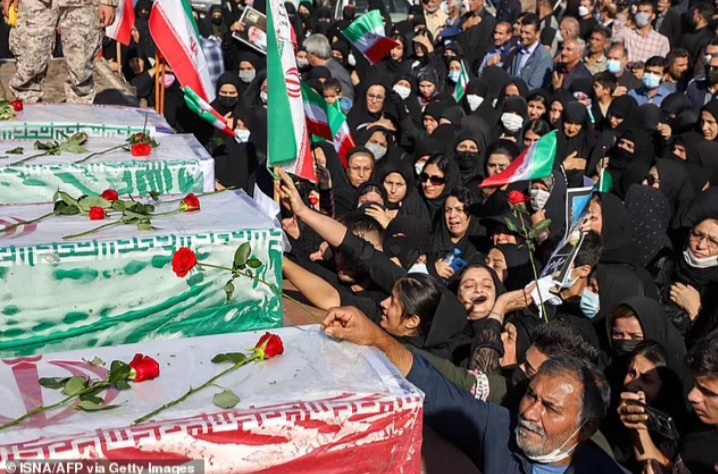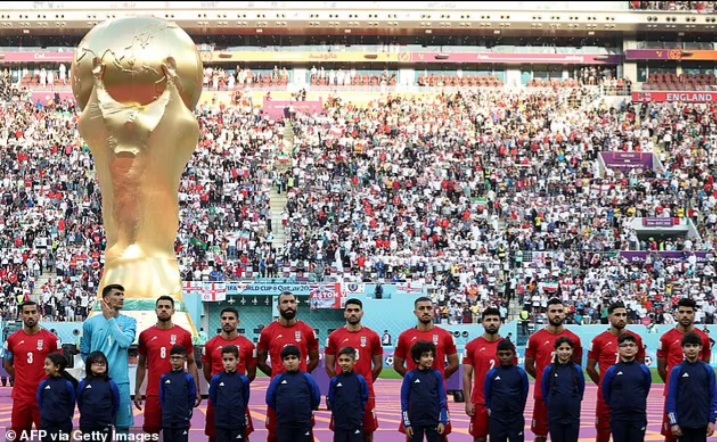Editor/
Iran is considering attacking the World Cup in Qatar to draw attention away from protests in the country that have killed more than 350 people, Israel’s intelligence chief has claimed.
Major General Aharon Haliva, the head of Israel’s Military Intelligence, warned that Tehran may launch an attack on the football tournament in Qatar to create instability in the region.
Haliva said that the aim would be to draw focus away from nationwide protests in Iran and instead on the fallout from such an attack.
His warning comes as widespread protests continue to rock the Islamic Republic following the death of 22-year-old Mahsa Amini in the custody of Iran’s morality police on September 16.
Haliva said that as public unrest grows, Iran is likely to be “much more aggressive” in their response.
“I am telling you that the Iranians are now considering attacking the World Cup in Qatar as well,” Haliva told an Institute for National Security Studies (INSS) conference in Tel Aviv.
“Iran is seeking to preserve instability as a constant thing. At a time when the world around it is stable and thriving — this is the opposite of what is happening inside Iran,” Haliva said, reports The Times of Israel.
“The World Cup is likely to be one of those events at which it tries to cause instability,” he added.
The nationwide protest movement in Iran first focused on Iran’s state-mandated hijab, or headscarf, for women, but soon morphed into calls for the downfall of Iran’s ruling Shiite clerics.
Haliva added that there is “real concern” within Iran that the unrest “endangers” the regime.
Haliva said, “At this stage, I do not see a risk to the regime but as the pressure on Iran increases, including internal pressure, the Iranian response is much more aggressive, so we should expect much more aggressive responses in the region and in the world.”
Dissent in Iran is growing following the death of Amini, with Iranian football fans even openly cheering the defeat of the national team against England at the World Cup yesterday.
Footage emerged overnight of a man sitting on the back of a moped, brandishing a huge Union Flag which streamed behind him as he rode through the streets of Tehran in the wake of his team’s 6-2 loss in Qatar.
“People are happy because of England’s victory,” the man who filmed the spectacle from his car said solemnly.
During the football match, Iran fans in the stands chanted Amini’s name, held signs and wore T-shirts with protest slogans and booed during the national anthem.
Elsewhere in the Iranian capital, thousands of people packed into residential high rises could be heard whistling and cheering as their team were routed, while another clip – blurred to protect the identity of those involved – showed protesters dancing in celebration following the defeat.
Such open disdain for Iran’s footballing campaign comes as widespread protests continue to rock the nation.

“The protest movement has overshadowed the football,” said Kamran, a linguistics professor who lives in the northern Iranian province of Mazandaran. “I want Iran to lose these games.”
Anusha, a 17-year-old whose Tehran high school has been rocked by protests, said the recent unrest had changed everything for her.
“A few months ago I would have said of course I want Iran to win against England and America,” she said. “Now, it’s strange. I really don’t care.”
Even as Iran’s national team perform on the world stage in Qatar, Iranian security forces continue to brutalise protesters.
More than 400 civilians are thought to have been killed since protests began in late September, with many more injured and arrested.
Ahead of the game yesterday, Iran’s players refused to sing their national anthem and the music was met with a torrent of boos from fans in the stands, many of them Iranians holding banners and wearing shirts with anti-regime messages.
The squad stood stony-faced as the anthem played at the Khalifa International Stadium, in an apparent sign of solidarity with protests currently engulfing their country back home.

Catherine Perez-Shakdam, a specialist in Iran at the Henry Jackson Society, told MailOnline that the team and fans will likely be “punished severely” for such an open display of defiance against the regime.
“The refusal by Iran’s football team not to sing the Islamic Republic’s national anthem will be a decision the players will pay for dearly.
“Similarly, any Iranian fan identified by the regime for booing the anthem will also face being severely punished. This is the brutal reality of modern-day Iran.
“Iran’s players may have forfeited more than just their freedom today; and their lives may not be the only ones on the line.
“Indeed, the regime has demonstrated a particular propensity to target dissidents’ family members and in doing so deter others from voicing their opinions.
“Given Iran’s horrendous track record, it stands to note that the players and fans who today shunned the regime knew full well about risks they faced.
“Such courage and dignity in the face of absolutism most certainly deserves our full recognition.”
Iran has been wracked by more than two months of anti-regime demonstrations sparked by the death of Mahsa Amini in police custody after she was arrested for failing to wear a compulsory hijab.
Since then, near-daily marches have taken place calling for an end to the country’s strict interpretation of Islamic laws and the overthrow of the mullahs’ regime.
News out of the country is limited amid widespread internet outages, but it is thought hundreds – if not thousands – of demonstrators have been killed by security forces in an increasingly violent crackdown.
Rights groups accuse security forces of firing live ammunition and bird shot at demonstrators, and of beating them with batons, in violence captured in numerous videos circulated online.
*MailOnline
0





